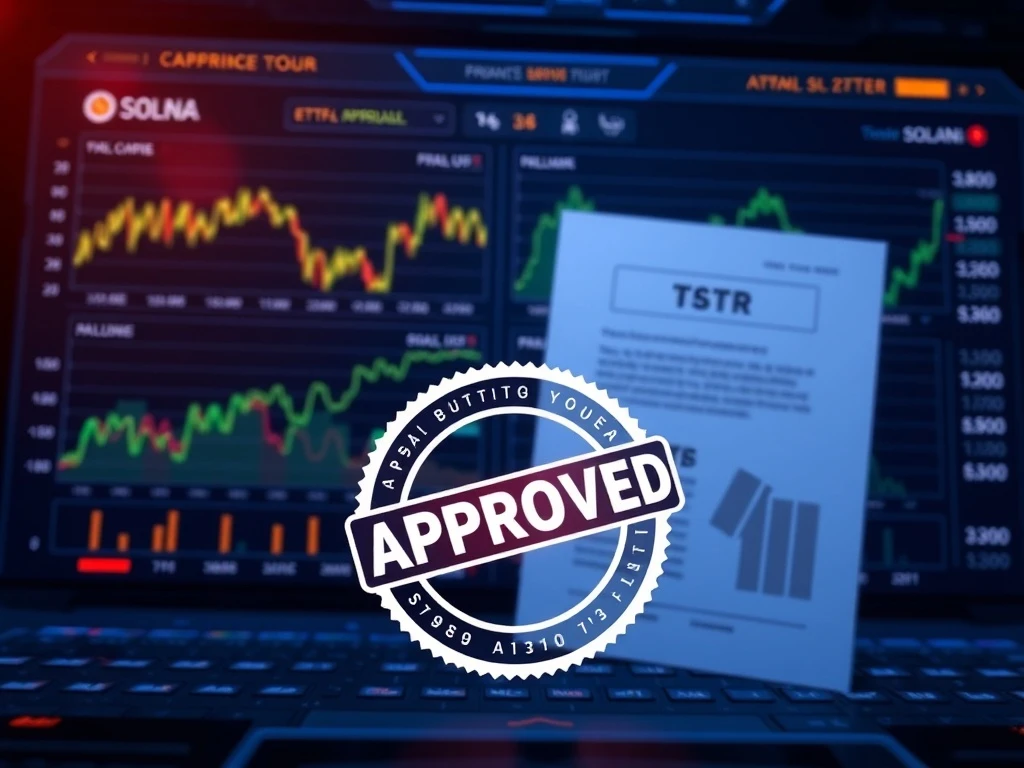Solana ETF Breakthrough: Cboe’s Bold Move with Invesco Galaxy Filing Sparks Crypto Market Optimism

The cryptocurrency world is buzzing with excitement as Cboe BZX Exchange takes a crucial step toward bringing a Solana ETF to market. In a move that could reshape crypto investing, the exchange has filed an amended S-1 registration statement for the Invesco Galaxy Solana ETF with the SEC. This development comes amid growing demand for regulated crypto investment products beyond just Bitcoin and Ethereum.
What Does the Solana ETF Filing Mean for Investors?
The amended S-1 filing represents significant progress in the ETF approval process. Here’s what investors should know:
- Provides regulated exposure to Solana without direct cryptocurrency ownership
- Follows the two-step ETF approval process (19b-4 exchange filing and S-1 registration)
- Places Solana alongside Bitcoin and Ethereum as potential ETF-backed assets
- Reflects growing institutional interest in Layer 1 blockchain platforms
Cboe’s Crypto ETF Push: Beyond Just Solana
The filing is part of a broader trend of crypto ETF applications. Canary Capital Group, the ETF’s sponsor, has also submitted applications for other altcoin ETFs, including one for Injective (INJ). This suggests asset managers are:
- Expanding crypto ETF offerings beyond dominant assets
- Testing regulatory boundaries for altcoin investment products
- Responding to growing investor demand for diversified crypto exposure
Regulatory Landscape for Crypto ETFs
The SEC currently has multiple crypto ETF applications under review, including proposals from VanEck and 21Shares. Key considerations include:
| Factor | Impact on Approval |
|---|---|
| Market Surveillance | Needs to demonstrate sufficient oversight |
| Liquidity | Must show adequate trading volume |
| Custody Solutions | Requires secure asset storage |
| Investor Protection | Needs robust safeguards |
Why This Solana ETF Matters for Crypto Adoption
Approval of a Solana ETF would represent a major milestone for several reasons:
- Validates Solana’s position as a leading blockchain platform
- Provides institutional investors with familiar access vehicles
- Could increase liquidity and stability in Solana markets
- May pave the way for other altcoin ETFs
What’s Next for the Invesco Galaxy Solana ETF?
While the filing is promising, investors should note:
- The SEC review process typically takes months
- Approval isn’t guaranteed – the SEC has rejected numerous crypto ETF proposals
- Market conditions and regulatory developments could impact the timeline
The amended S-1 filing for the Invesco Galaxy Solana ETF marks an exciting development in the evolution of crypto investment products. While regulatory hurdles remain, this progress suggests growing acceptance of cryptocurrencies within traditional finance frameworks. As the SEC continues its review, the crypto community will be watching closely for signs that could signal a new era of mainstream crypto adoption.
Frequently Asked Questions
What is a Solana ETF?
A Solana ETF is an exchange-traded fund that would track the price of Solana’s native token (SOL), allowing investors to gain exposure to SOL’s price movements without directly owning the cryptocurrency.
How does the ETF approval process work?
The process involves two main steps: 1) A 19b-4 filing by the exchange to list the ETF, and 2) An S-1 registration statement by the issuer detailing the fund’s structure and operations.
When might the Solana ETF be approved?
There’s no set timeline. The SEC review process can take several months, and approval isn’t guaranteed. The agency has historically been cautious about crypto ETFs.
How would a Solana ETF differ from Bitcoin or Ethereum ETFs?
While similar in structure, a Solana ETF would track a different underlying asset. Solana is considered more of an “altcoin” compared to Bitcoin and Ethereum, which could affect its regulatory treatment.
What are the benefits of a Solana ETF?
Key benefits include regulated access to Solana exposure, no need for cryptocurrency wallets or exchanges, and potential inclusion in traditional investment portfolios.
Are there risks to investing in a Solana ETF?
Yes, risks include regulatory uncertainty, potential rejection by the SEC, and the inherent volatility of cryptocurrency markets even in ETF form.










